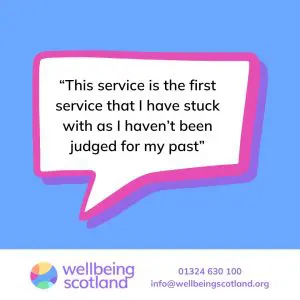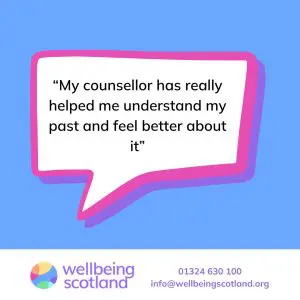Here, we find out more about Wellbeing Scotland and the support they offer.
Wellbeing Scotland have been a Delivery Partner with Future Pathways since 2016. Their services are available to people who are experiencing trauma as a result of child abuse. Wellbeing Scotland have been supporting people for over 30 years. They offer different kinds of support:
- In person at their offices in Alloa and Glasgow
- Online
- By telephone
Aim
Wellbeing Scotland aim to support people’s wellbeing. They do this in different ways. For example, by helping someone talk about and understand their trauma. Or by helping people develop coping skills. Wellbeing Scotland help people feel listened to and understood.
Mission
Wellbeing Scotland’s job is to give support to people who have been affected by child abuse. They try to make sure that:
- People can access the support they need at the right time
- People get support for different parts of their life, not just one part of it (for example, you can share and talk about different experiences that have affected your life)
- Support is adapted to suit people’s needs
Wellbeing Scotland work with people to find what will be helpful for them.

Getting support
Future Pathways make referrals to Wellbeing Scotland. Then, you can talk to a trauma counsellor at Wellbeing Scotland. The trauma counsellor will:
- Tell you about how support works
- Tell you about the different types of therapy you can access
- Help you to look at the ways that therapy might help you
- Talk about your needs
Talking about your needs means finding out more about how your life is now and if you have any other support around you. This helps to see what is important for you and helps you to set your goals.
If you would like to have a conversation with Wellbeing Scotland, please let your Future Pathways Support Coordinator know.
Referral and Assessment
Wellbeing Scotland carry out an assessment to make sure they can provide the right kind of support. At an assessment, you can:
- Speak to an experienced worker who understands the signs and symptoms of trauma
- Find out more about the types of support you can access, like counselling or groupwork
- Talk about why you want to access support
- Think about how support can be tailored to meet your needs
Emotional Support
We focus on what might help. Wellbeing Scotland will:
- Look at the ways you can feel safe
- Help you build coping skills to manage distress
- Help you learn how to find ways to help manage difficult emotions and thoughts
- Explore what therapy can be like to see if it feels right for you
- Think about your goals for therapy

Counselling
Wellbeing Scotland offer a safe and confidential space for one-to-one support. You can talk about how your experiences might have affected your health, wellbeing and quality of life.
Group work
Group work is a chance to connect with people. It is a place where people can talk and grow together. And it is a chance to think about your future beyond therapy. For example, you might want to focus on relationships or emotions, or develop skills to cope. In group work, you can:
- Learn exercises to help you relax
- Talk to other people about how you feel
- Take part in creative activities to build new skills



